Ramadan 2023 in UAE: Insights and Cultural Significance


Intro
As the crescent moon makes its annual reappearance in the sky, Ramadan approaches, bringing significant cultural and spiritual resonance to the UAE. In 2023, the holy month promises to be an impactful period not just for the Muslim population but also for the wider community, including investors and expatriates. While the core essence of Ramadan involves fasting and spiritual reflection, it profoundly influences various aspects of daily life and market dynamics in the country.
Throughout this article, we'll venture deeper into the implications of Ramadan on the UAE, especially within the real estate sector. Expect insights that not only highlight the observances during this holy month but also dive into how these practices bleed into aspects like community living, amenities, and potential investment opportunities.
With the UAE's multicultural fabric, understanding how Ramadan integrates into lifestyle choices becomes crucial for residents and investors alike. What happens when the sun sets? How do neighborhoods collaborate and engage during this time? What makes the Dubai real estate market tick amidst such changes? All these threads weave an intriguing tapestry of life in the UAE during a month that is more than just a calendar date—it's a vital period filled with significance and change.
Understanding Ramadan
Understanding Ramadan is pivotal for grasping the cultural and spiritual fabric of the UAE, especially in 2023. As a month-long observance, Ramadan transcends mere fasting; it is about reflection, community, and spiritual growth. For residents, expatriates, and investors alike, understanding this period can foster deeper connections and respect toward local customs, essential in a region marked by cultural diversity. The insights gleaned from this section provide a foundational knowledge essential for navigating life in the UAE during Ramadan.
Definition and Origins
Ramadan is the ninth month of the Islamic lunar calendar, renowned for its significance among Muslim communities worldwide. It originates from the Quran, which states that this is the month in which the holy book was revealed to the Prophet Muhammad. As such, Ramadan carries a weight far beyond just a time for abstinence; it stands as a spiritual voyage intended to encourage believers to seek purification and growth. The historical traditions surrounding Ramadan date back to the time of the Prophet and have been meticulously preserved through centuries. Each day, Muslims fast from dawn until dusk, which means no food or drink, but it is also a time dedicated to prayer, self-restraint, and introspection.
Religious Significance
The religious significance of Ramadan cannot be overstated. It is a time where Muslims are expected to strengthen their relationship with Allah through increased prayer and reading of the Quran. Fasting during this month is seen as a way to develop empathy for those less fortunate, fostering a sense of community and charity. It serves as a reminder of the importance of gratitude, humility, and the transient nature of worldly possessions.
"Fasting is not just a diet; it's a divine framework for spiritual elevation."
In the UAE, the essence of Ramadan is reflected in both public and private life. Businesses often adjust their hours to accommodate for the evening meals known as Iftar, where families and friends gather to break their fast. The call to prayer resonates across the landscape, emphasizing the month’s sanctity. The blend of spirituality and contemporary life creates a unique experience that defines the essence of Ramadan in the Emirates.
Ramadan in the UAE
The significance of Ramadan in the UAE cannot be overstated. This holy month plays a crucial role not only in the spiritual lives of Muslims but also in the socio-cultural fabric of the nation. It offers an opportunity for individuals to cultivate empathy, self-discipline, and community ties while also influencing various sectors, including business, real estate, and tourism. Understanding how Ramadan intertwines with local customs and daily norms can greatly benefit investors, expatriates, and anyone looking to engage with the Emirati society.
Historical Context
Ramadan's roots in the UAE trace back centuries, intertwining with the region's Islamic identity. The spread of Islam in the Arabian Peninsula during the 7th century marked the beginning of Ramadan observances. Traditional practices have evolved significantly, blending ancient customs with more contemporary ones while retaining essential Muslim principles.
Historically, people in the UAE have approached Ramadan with a sense of reverence. The practice of fasting is not just about abstaining from food but also a way to purify the soul and renew one's connection to faith. In times gone by, communities would prepare for the month with particular eagerness. The rituals surrounding Ramadan serve to unite families and communities, reinforcing ties and creating a collective atmosphere of spirituality.
Today, while modern conveniences have altered some customs, the essence of Ramadan remains intact. The UAE, with its dynamic environment, has infused traditional Ramadan practices with innovative approaches, such as modern iftar street festivals and charity drives, bridging cultural gaps among its diverse population.
Cultural Traditions
Culturally, Ramadan in the UAE encompasses a rich tapestry of traditions that provide unique experiences for locals and expatriates alike. From communal prayers at mosques to vibrant festivities, the month is marked by a plethora of customs.
Key aspects of cultural traditions during Ramadan include:
- Iftar and Suhoor: These are the two meals surrounding the fast. Suhoor is consumed before dawn, while iftar breaks the fast at sunset. People often gather in homes or public places, creating a sense of belonging and community.
- Charitable Acts: The spirit of generosity is magnified during Ramadan. Many Emiratis engage in charitable initiatives, contributing to those less fortunate. It’s not uncommon to see organizations providing free iftar meals or distributing food packages to needy families.
- Decorations: Streets and homes often glow with lights and decorations during Ramadan. Special ornaments and lanterns, known as
Start Date of Ramadan in
The start date of Ramadan holds a significant place in the calendar for Muslims around the world. In 2023, this holy month is expected to begin around March 23, depending on the sighting of the moon. Understanding when Ramadan starts is crucial for several reasons.
For the Emirati community, the onset of Ramadan dictates a shift in daily routines, cultural practices, and even economic activities. With a population that blends local traditions and a vibrant expat presence, the announcement of the Ramadan start date resonates beyond personal observance – it influences the entire society's rhythm. A clear understanding of this timing aids both residents and investors to align their expectations accordingly.
Astronomical Predictions
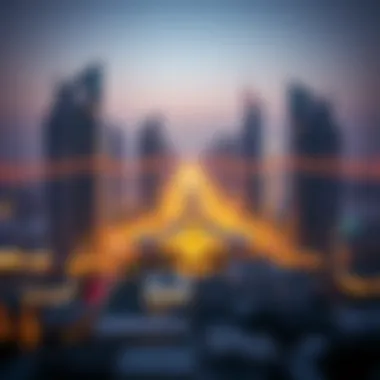

Astronomically, Ramadan's start date is closely linked to lunar cycles. The month of Ramadan is observed on the sighting of the crescent moon, marking the beginning of the ninth month in the Islamic calendar. Traditionally, astronomers keep an eye out for this delicate sliver of moon in the western sky just after sunset.
In 2023, calculations by astronomers predict that the new moon may emerge on the evening of March 22, paving the way for Ramadan to commence the following day. However, this date is never set in stone. The actual commencement can shift, depending on weather conditions or geographical factors that might obscure the sighting of the moon. Therefore, local authorities often advise the community to look out for official announcements confirming the start of Ramadan.
Here are a few important aspects of this astronomical prediction:
- Visibility Conditions: Weather plays a vital role; clear skies are critical for spotting the crescent moon.
- Geographical Differences: Regions may witness the moon sighting at different times, impacting local observance.
- Technological Advances: Modern astronomy tools provide predictions, yet they respect the traditional method of moon sighting.
Official Announcements
Official announcements from the UAE Moon Sighting Committee, typically made after the evening prayers, set the stage for Ramadan's commencement. These announcements draw attention and excitement across the country, as people await confirmation to adjust their plans and routines. Usually, the committee convenes to assess moon visibility, utilizing both traditional and scientific methods.
Once the moon is sighted or confirmed through scientific calculations, the announcement is disseminated through various channels:
- State Media: Local television and radio broadcasts provide immediate updates.
- Social Media: Platforms like Twitter and Facebook become hubs for rapid dissemination of information.
- Community Gatherings: Local mosques often serve as focal points for sharing news and engaging the community.
The importance of these announcements cannot be overstated. They trigger a flurry of preparations—businesses alter their hours, families plan iftar gatherings, and charitable organizations ramp up their outreach efforts. Thus, knowing the official start date is not merely about ritual; it has profound implications for the social fabric and economic activities throughout the month of Ramadan in the UAE.
Impact on Daily Life
Ramadan is not just a month of fasting; it profoundly impacts daily life across the UAE, intertwining cultural, social, and economic threads. During this holy month, daily routines shift dramatically, creating a unique atmosphere that influences work schedules, social interactions, and even business operations. Understanding these changes is crucial for investors, homebuyers, agents, developers, and expatriates, as they navigate both the opportunities and challenges that arise during this period.
Business Hours Adjustments
One of the most salient changes during Ramadan pertains to the adjustment of business hours. Many organizations, whether in the private or public sector, adopt shorter working hours. Typically, the workday may begin around 9 a.m. but often ends around 3 p.m. This adjustment not only allows employees to adhere to fasting times but also reflects the cultural significance of the month.
Key Considerations for Adjusted Hours:
- Sector Variations: Different industries may have varying practices. For instance, retail businesses might extend their hours in the evenings, appealing to those breaking their fast, while government offices might stick closely to shorter hours.
- Productivity Shifts: Employers often seek to maximize productivity during these condensed hours, focusing on critical tasks in a shorter timeframe. Employees, especially in sectors like hospitality or health care, are tasked to adapt quickly to the new demands.
- Customer Expectations: Businesses should be aware that customer foot traffic can significantly increase after sunset, leading to longer wait times at restaurants and shops. Preparing for this surge is vital for maintaining customer satisfaction.
Public Behavior Expectations
The month of Ramadan carries with it specific expectations surrounding public behavior, as the entire community engages in a collective experience. These behavioral norms are especially pertinent for expatriates and visitors unfamiliar with local customs.
Cultural Etiquette to Note:
- Fasting Respect: Non-Muslims are generally expected to refrain from eating, drinking, or smoking in public during daylight hours. This aligns with the spirit of fasting and shows respect for those who partake.
- Quietude in Public Spaces: Ramadan is a time of reflection and reverence. It is often advised that people maintain a low profile in conversation, keeping noise to a minimum in public areas, especially during prayer times.
- Community Engagement: Engaging in communal iftars, or breaking fast gatherings, is highly encouraged. This is an excellent opportunity for social bonding and understanding cultural practices. Participating can foster goodwill and provide deeper insights into local traditions.
“During Ramadan, the emphasis is on compassion, community, and consideration; it's an ideal moment to strengthen the ties that bind us.”
Understanding these elements of adjustment and expectation can help smooth the transition into the unique lifestyle presented during Ramadan. Awareness fosters respect and enhances relationships among residents and visitors alike. For those investing or doing business in the UAE, recognizing the heartbeat of daily life during this month can uncover new opportunities and demonstrate a commitment to cultural integration.
Ramadan and the Real Estate Market
Ramadan carries a unique significance well beyond its spiritual aspects; it has tangible effects on many sectors, particularly real estate, in the UAE. As the holy month unfolds, its influence reaches various corners of the market, affecting everything from property buying patterns to rental trends. Investors, developers, and homebuyers closely observe this period, as it can present unique opportunities. Understanding these elements can better inform strategies and decisions during this pivotal time.
Market Trends During Ramadan
As the sun sets, breaking the fast during Ramadan shapes consumer behavior in many ways. Traditionally, there is an uptick in family gatherings and community engagements after sunset. This cultural shift often means that potential buyers and renters are more inclined to view properties in the later hours of the day, rather than during the typical working hours.
Furthermore, the month of Ramadan sees many developers and real estate agents adapting their selling tactics. Some may offer promotions tied specifically to the season, appealing to the community spirit that prevails. Advertisements might reflect more culturally relevant themes during Ramadan, tapping into people's emotions and motivations.
Here are some observed trends in the real estate market during Ramadan:
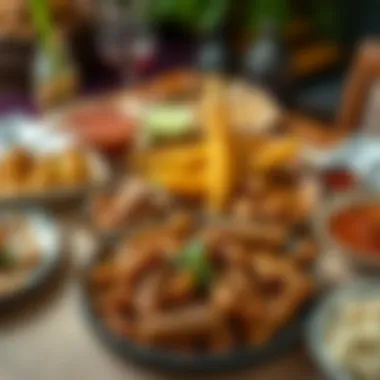
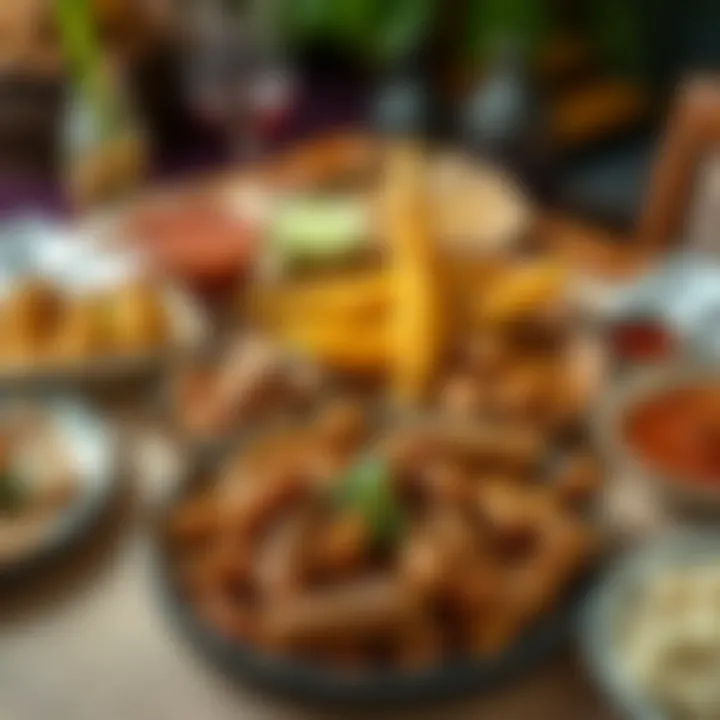
- Increased interest in family homes: Many families tend to reassess their living situations, seeking larger spaces that accommodate their gatherings and provide comfort during the extended hours spent together.
- Heightened rental activity: With expatriates often relocating to new areas to be closer to work or loved ones, there’s typically a spike in leasing activity. This creates scenarios where landlords may be more flexible in negotiations given demand.
- Post-Ramadan boom: After Ramadan concludes, a wave of real estate activities is common. Many choose to finalize purchases, propelled by newfound optimism and the traditional Eid celebrations.
Investment Opportunities
The month of Ramadan serves as a unique juncture for savvy investors. Amidst the celebratory atmosphere and community bonding, certain opportunities can emerge that savvy investors should not overlook.
For instance:
- Commercial properties: The surge in foot traffic in public spaces and retail areas during Ramadan paves the way for businesses looking to capitalize on consumer behavior. Investing in commercial spaces near popular Iftar spots can yield significant returns.
- Residential developments targeted for families: Developers who focus on creating family-friendly environments tend to find a ready market. Properties with attractive amenities for gatherings and community interaction often see high interest during this month.
- Festive promotional campaigns: Real estate companies might run Ramadan-themed marketing campaigns, which can give homebuyers and investors an added incentive to explore new properties—sometimes at a more favorable rate.
“Understanding the impact of Ramadan can help stakeholders in the real estate market navigate changes more smoothly and make informed decisions.”
Community Activities During Ramadan
Community activities during Ramadan are pivotal in promoting collective spirit, deepening relationships, and enhancing the overall experience of this blessed month. As people gather together to celebrate and reflect, these activities play a crucial role in fostering a sense of belonging and unity among individuals. The benefits of engaging in communal practices extend not just to personal fulfillment but also to the enrichment of cultural ties that strengthen the local fabric of the UAE.
Charitable Initiatives
One of the most prominent aspects of community activities during Ramadan is the focus on charitable initiatives. Generosity takes on a more profound meaning in this month, with many individuals and organizations making a concerted effort to give back to those in need. The act of giving is not only a religious duty but also a reflection of the communal ethos prevalent among Emiratis.
Charities such as the UAE Red Crescent and various local mosques organize events to distribute food and essential supplies to less fortunate families. Contributions can range from food drives to monetary donations. The act of sharing Iftar meals with those less fortunate bridges social gaps and reinforces the bonds of compassion within the community.
- Many families take part in initiatives like:
- Engaging in these initiatives not only fulfills one's social responsibility but also enhances the spiritual experience of Ramadan.
- Food donation drives: ensuring no one goes hungry at Iftar.
- Volunteer opportunities: people come together to serve meals at local mosques or charitable centers.
Charity during Ramadan is not merely an obligation; it is a way to connect hearts and nurture humanitarian values.
Cultural Festivals
Cultural festivals during Ramadan are yet another avenue for community engagement, enriching the experience for both residents and visitors alike. These festivals celebrate the essence of shared heritage, embracing cultural diversity while fostering a sense of unity. Various events are organized throughout the country, showcasing traditional arts, crafts, and local cuisine, creating a vibrant atmosphere that resonates with the spirit of Ramadan.
- Events often include:
- Cultural performances: Such as poetry readings, music, and dance that reflect Emirati heritage.
- Art exhibitions: Featuring local artists’ work that showcases themes of faith, community, and generosity.
The combination of cultural expressions and communal activities invites everyone to partake in the spirit of the month, creating a tapestry of experiences that strengthens ties within the diverse population of the UAE. Public places such as parks and community centers often come alive with decorations, performances, and markets, turning them into vibrant hubs of activity.
In summary, community activities during Ramadan underscore the importance of charity and cultural appreciation, allowing individuals to come together in a spirit of generosity and celebration. As these gatherings unfold, they serve as a reminder of the core values that bind the Emirati community, ensuring the essence of Ramadan is felt collectively and profoundly.
Iftar and Suhoor Traditions
Iftar and Suhoor are pillars of the Ramadan experience, serving as not just meals, but opportunities for connection and reflection. They are exquisite moments that symbolize the breaking of fast and the preparation for another day of fasting. More than just food and drink, these traditions carry with them an emotional and spiritual weight that resonates deeply within the community.
Food and Beverage Trends
As the sun sinks below the horizon, the call to maghrib prayer signals the start of Iftar. The table is often a colorful spread filled with delights. Dates and water typically begin this meal, following the Sunnah of the Prophet Muhammad. Beyond that, traditional dishes hold great importance. In the UAE, dishes like Shorbat Adas (lentil soup), Harees, and Samboosa appear prominently. The culinary scene embraces fusion as well, blending international flavors. It’s common to see dishes inspired from India, Egypt, and even Western cuisines.
The beverage choices also reflect this blend. Karak tea, flavored with spices, has gained popularity as a favored drink during Ramadan evenings. Freshly squeezed juices like qamar al-din (apricot juice) and tamarind juice are equally sought after, providing refreshing options to quench thirst after a long day of fasting.
Incorporating local flavors, such as saffron and rose water, creates a tapestry of flavors that highlight the Islamic tradition while catering to diverse palates.
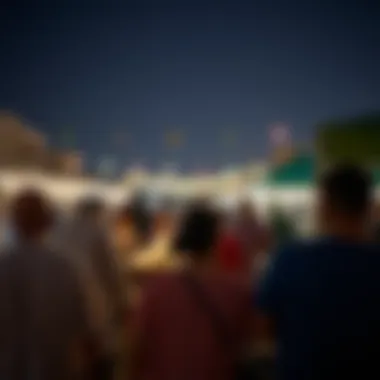
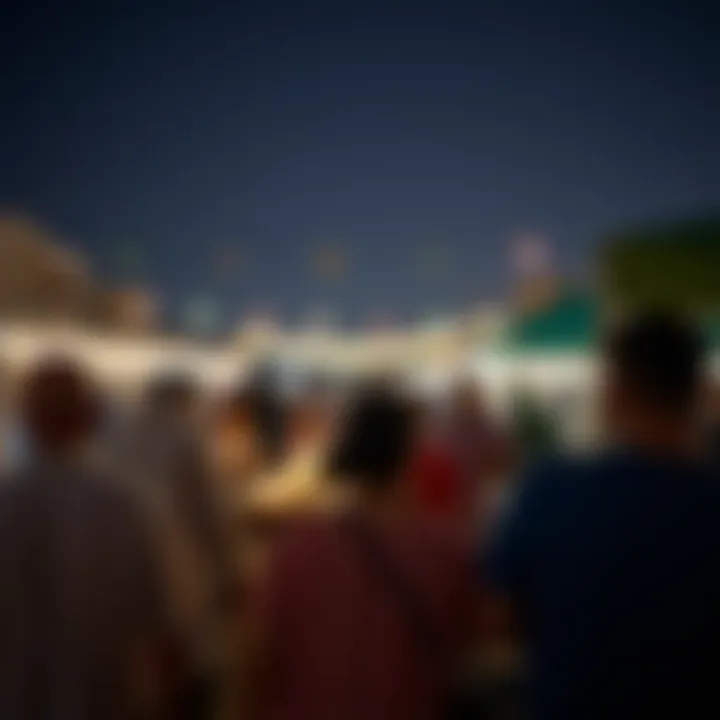
Community Gatherings
The beauty of Iftar extends beyond the food itself; it's a time for families and friends to gather, fostering a sense of community. Many families prefer to break their fast together, with houses filled with laughter, conversation, and gratitude. In addition to home gatherings, community Iftars have become popular; local mosques and organizations often host large Iftar events, welcoming anyone regardless of their background.
During these communal gatherings, the atmosphere shifts to one of unity and spirit. People who may not know each other share meals and stories, often creating bonds that last beyond the month of Ramadan. These community events can attract hundreds, sometimes thousands, allowing individuals to experience Iftar in a grand collective setting.
"Sharing Iftar is more than nourishing the body; it nourishes the soul. The spirit of giving comes alive during Ramadan."
In contrast, Suhoor, the pre-dawn meal, is typically more private and often viewed as a quiet moment of preparation for a new day. Families come together early in the morning, enjoying hearty meals that often include foods rich in fiber and protein to provide long-lasting energy. Dishes such as oatmeal, eggs, and yogurt are common.
The vibrant blend of culture and communal tradition seen during Iftar and Suhoor significantly enhances the Ramadan experience in the UAE, making these meals an essential part of the month, where taste and togetherness go hand in hand. For expatriates and locals, understanding these traditions can help navigate social scenarios, ensuring they enjoy the warm camaraderie this month brings.
By being aware of the culinary trends and community practices during Ramadan, it becomes easier for investors, homebuyers, and expatriates to appreciate the essence of the Emirati lifestyle.
Travel Considerations
The onset of Ramadan in the UAE not only transforms the cultural landscape but also has significant implications for visitors. Understanding travel considerations during this period is essential for making the most of one’s experience. Ramadan brings a unique blend of cultural richness that attracts tourists eager to participate in or observe these traditions. However, there are specific elements and benefits to bear in mind when planning a trip during this holy month.
Increased Tourist Interest
During Ramadan, many travelers become curious about how the observance is celebrated in the UAE, a nation known for its rich traditions and modernity. This surge of interest can be attributed to several key factors:
- Cultural Engagement: Many tourists seek a deeper understanding of Islamic customs and traditions. Ramadan presents an opportunity to witness local practices, including the breaking of the fast at Iftar gatherings, where families and communities come together.
- Unique Experiences: Visitors are often drawn to the special events and activities designed to mark the month. From night markets in Dubai to light displays in Abu Dhabi, the environment buzzes with a festive spirit.
- Educational Opportunities: For many, Ramadan is not just about the festivities; it's an educational experience too. Travelers are keen to learn about the significance behind various practices, such as fasting and prayer.
However, with this rise in interest, tourists should also be considerate of local customs and etiquette. It’s advisable to respect the fasting hours and dress modestly, particularly in public areas. Local laws require that eating, drinking, and smoking in public spaces be avoided during daylight hours.
Local Attractions Open During Ramadan
Finding activities while exploring the UAE during Ramadan can be quite rewarding, as several local attractions remain open, albeit with modified operating hours. Here’s an overview of what travelers can enjoy:
- Cultural Sites: Major cultural landmarks, such as the Sheikh Zayed Grand Mosque in Abu Dhabi, remain accessible. These venues often host events that educate visitors about Ramadan’s significance and promote cultural understanding.
- Shopping Malls: Shopping centers usually extend their working hours post-Iftar, catering to the influx of visitors. Malls such as The Dubai Mall or Mall of the Emirates are great for late-night shopping and special Ramadan-themed promotions.
- Dining Experiences: Although many restaurants do not serve food during the day, most open their doors for Iftar. Visitors can indulge in buffets featuring traditional dishes, such as Harees, and some might even enhance their dining experience with special events or chef showcases.
- Festivals and Markets: Various cities host Ramadan bazaars or night markets where visitors can shop, eat, and immerse themselves in local festivities. These markets often enliven the atmosphere, accommodating both the local community and tourists.
"Experiencing Ramadan in the UAE invites travelers into a world enriched by tradition, community, and spirituality."
By doing so, visitors can ensure a memorable time while acknowledging the importance of this significant month in Emirati life.
The End
The conclusion of our exploration into Ramadan in the UAE serves as a summation of various threads interwoven throughout this significant period. The article shines a spotlight on crucial aspects such as cultural practices, community engagement, and economic impacts, all of which play a vital role in shaping Emirati society during this holy month. Ramadan is not merely a religious observance; it is a time for reflection, unity, and growth that resonates beyond the mosques and into homes and businesses.
From the outset, this article aimed to provide readers with a nuanced understanding of the importance of Ramadan in 2023. It’s clear that the month affects many facets of life in the UAE, influencing behavior at work, shifting community interactions, and molding investment opportunities, particularly in the real estate sector. For stakeholders like investors and expatriates, understanding these shifts is paramount for making informed decisions that align with local customs.
Summary of Key Points
As we draw our discussion to a close, let's revisit some key points raised:
- Cultural Practices: Ramadan is steeped in traditions that include daily fasting, communal prayers, and charity. Each of these practices not only underscore the spiritual essence of Ramadan but also foster community bonds.
- Economic Impact: Business hours shift during Ramadan, allowing for adjustments in daily operations. Retail and real estate markets experience fluctuations during this time, creating unique opportunities.
- Community Spirit: Initiatives such as iftar gatherings highlight the importance of togetherness, serving not just as a means of breaking the fast but as a celebratory event that strengthens community ties.
- Travel Considerations: The surge in tourism during Ramadan, bolstered by cultural festivals, adds vibrancy and draws global interests to local attractions that may have different operational hours.
Future Implications for and Beyond
Looking ahead to 2024, the implications of Ramadan extend into not just religious observance but also influence on socio-economic patterns in the UAE. The growth of community-centric initiatives suggests that there will likely be a stronger emphasis on inclusivity, enticing more expatriates and tourists to engage in local customs.
Moreover, investors should keep a keen eye on how Ramadan shapes market trends each year. For instance, understanding the rhythm of demand in property investments during peak seasons can lead to strategic advantages.
As the landscape evolves, one can anticipate that the blending of traditional practices with modern economic opportunities will continue to transform the ways in which Ramadan is celebrated and observed. The insights gathered from this year's experience will undoubtedly inform future strategies, making it crucial for stakeholders to stay informed and adaptable to changing dynamics.
In summary, Ramadan in the UAE serves as a mirror reflecting the unity of its people while simultaneously creating a fertile ground for economic growth and cultural exchange that goes beyond the Ramadan calendar.
For further readings and details on Ramadan's significance and practices, resources like Britannica, Wikipedia, and other local websites such as VisitDubai provide additional context and perspectives.



